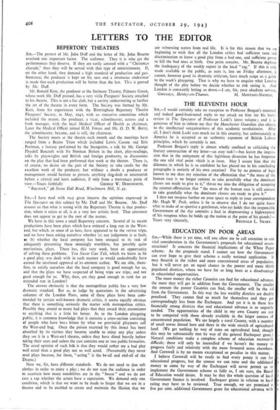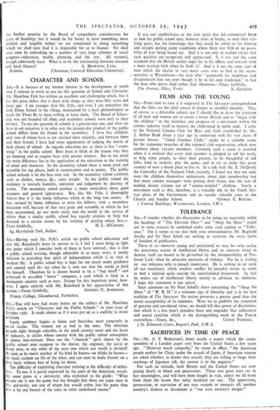EDUCATION IN POOR AREAS
SIR,—While there is yet time, will you allow me to call attention to one vital consideration in the Government's proposals for educational recon-
struction? It concerns the financial implications of the White Paper scheme. As the proposals stand, I cannot see how the Government can ever hope to give their scheme a really national application. It
may flourish in the richer and more concentrated areas of population, but it will never get an equal chance in the poorer and more thinly populated .districts, where we have for so long been at a disadvantage in educatiohal opportunities.
The more money the richer Counties can find for educational advance, the more they will get in addition from the Government. The smaller the amount the poorer Counties can find, the smaller will be the aid from the Government. In this way the less wealthy districts are doubly penalised. They cannot find so much for themselves and they get correspondingly less from the Exchequer. And yet it is in these less financially strong districts that real educational advance is so urgently needed. The opportunities of the child in my own County are not to be compared with those already available in the larger centres of concentrated population. We are largely a rural County, with a number of small towns dotted here and there in the wide stretch of agricultural land. (We get nothing by way of rates on agricultural land, though this may be substantially met by way of the general Exchequer grant) Natural conditions make a complete scheme of education necessarily difficult; • these will only be intensified if we haven't the money to progress fairly and relatively with the more favoured -areas elsewhere. And Cornwall is by no means exceptional or peculiar in this matter.
I believe Cornwall will be ready to find every penny it can for educational progress, but the utmost we can raise and the additional money to come by way of the Exchequer will never permit us to implement the Government scheme as fully as, I am sure, the Board of Education would desire. It may be that the whole question of local Government finance is involved. Exchequer grants in relation to local rating may have to be reviewed. True enough, we are promised a five per cent, additional Government grant for educational advance with
the further promise by the Board of sympathetic consideration for cases of hardship; but it would be far better to have something more definite and tangible before we are committed to doing something N‘hich we shall later find it is impossible for us to finance. We shall very soon be embarking on a number of very large schemes of social progress—education, health, planning and the rest. All national, though admittedly local. What is to be the relationship between national
Bodmin. (Chairman, Cornwall Education Committee).



























 Previous page
Previous page